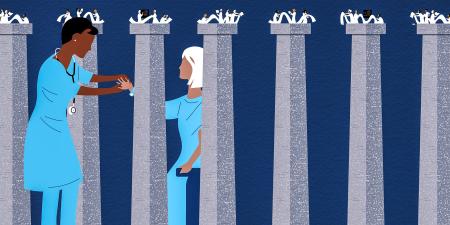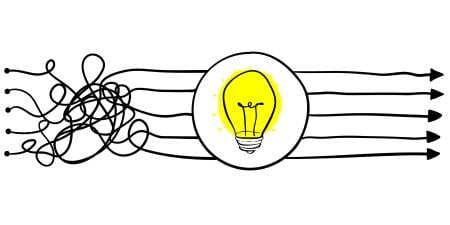Abstract
This article interrogates the “watch one, do one, teach one” model that is common in health professions education and suggests how to augment it with critical rigor to better prepare all levels of health professional learners for affective demands of just practice.
Trouble With the Trio
A common set of assumptions in health professions teaching is that when a student, trainee, or clinician watches something, they can do that thing and then, as if by magic, also teach that thing. This assumption set, the linguistic summation of which is “watch one, do one, teach one,” seems to operate at all levels of health professions education, including continuing education, so the term clinician is used henceforth to refer to each of these learners. Although “watch one, do one, teach one” might be sufficient for some procedural skill acquisition, it dramatically oversimplifies how affective skill sets in health care work are taught and learned, especially in settings in which clinicians must practice orienting themselves to persons who are suffering and, specifically, to persons suffering from conditions of injustice that undermine their health and health care.
Teaching Character and Just Action
Unlike many words in health care with Greek origins, patient comes from the Latin patiens, which means to suffer. A moral psychological foundation of affective practice in health care is that clinicians who tend those who suffer have special duties to discern how patients are vulnerable and to respond with care through just action. Although he didn’t apply his ideas specifically to health care, Paulo Freire understood these connections among perception, motivation, just action, and character.
In his critical pedagogy writings of the 1970s,1 for example, Freire suggests that a key function of teaching is giving learners opportunities to practice who they want to become. In health care, experiencing motivation to become a clinician is referred to by some as a calling. A calling can be to a long-term career2 or respond to a specific, real-time situational landscape. In ethics terms, calling is a metaphor for a moral psychological cascade that generally includes 3 things: discerning a reason to act, experiencing motivation to act, and acting. These 3 things have also been used to explain how erosion of one’s sense of calling can lead to burnout3 and can damage the characters of those who cannot act as they are motivated to act, sometimes due to external, systemic constraints on their moral agency.4
Improvisational co-creation among teachers and learners in theater settings enables the practice, the rehearsal, of responding to injustice.
Augusto Boal was concerned specifically with individual moral agents’ needs to practice overcoming forces that constrain their impulses to act justly. His work suggested that improvisational co-creation among teachers and learners in theater settings enables the practice, the rehearsal, of responding to injustice. Writing in the 1970s, Boal drew upon Freire’s ideas5 to establish Theater of the Oppressed to help learners achieve readiness to act to disrupt injustice in real time, in real persons’ lives.
Preparing Clinicians for Anti-Oppressive Practice
Many health professions students demanded, during and following summer 2021 protests and uprisings in the United States, that their curricula equip them to respond robustly to needs of patients whose illnesses and injuries are exacerbated by social, cultural, historical, political, and material conditions of injustice.6 To modify “watch one, do one, teach one” to express Freire’s, Boal’s, and these students’ demands to be more formally and fully moral psychologically prepared for just action, we might interrogate each phrase as follows:
When invited to “watch one,” clinicians should also be prepared to ask questions like these:
Which habits of perception are cultivated in health professions education—and why and when— and who is well- or ill-served when clinicians learn to see patients’ needs and vulnerabilities in specific ways?
When invited to “do one,” clinicians should also be prepared to ask questions like these:
How should clinicians’ perceptions of patients’ needs and vulnerabilities inform what clinicians think patients deserve from them? Are clinicians’ conceptions of what patients deserve from them generous or meager, and how does what they think patients deserve from them give rise to or inhibit their motivation to act justly?
When invited to “teach one,” clinicians should also be prepared to ask questions like this:
Which habits of perception and motivation should clinicians practice to maintain generous conceptions of what patients deserve from them?
Double Down on “Woke”
Asking critical reflection questions like these can help health professions faculty prepare clinicians to cultivate robust awareness of the moral psychological and affective underpinnings of their curricula, which can better equip them to commit anti-oppressive actions and series of actions that can promote the interests of patients suffering injustice. Call these suggested amendments to “watch one, do one, teach one” woke, if you must. Freire and Boal remind us that one duty of academic health institutions’ faculty is to prepare clinicians to meet the moral psychological and characterological demands of just practice.
References
-
Freire P. Pedagogy of the Oppressed. Bergman Ramos M, trans. Herder & Herder; 1970.
- Kao AC, Jager AJ. Medical students’ views of medicine as a calling and selection of a primary care-related residency. Ann Fam Med. 2018;16(1):59-61.
- Jager AJ, Tutty MA, Kao AC. Association between physician burnout and identification with medicine as a calling. Mayo Clin Proc. 2017;92(3):415-422.
-
Rentmeester CA. Should a good healthcare professional be (at least a little) callous? J Med Philos. 2007;32(1):43-64.
-
Boal A. Theater of the Oppressed. McBride CA, McBride MOL, trans. Urizen Books; 1979.
- Asmerom B, Legha RK, Mabeza RM, Nuñez V. An abolitionist approach to antiracist medical education. AMA J Ethics. 2022;24(3):E194-E200.



